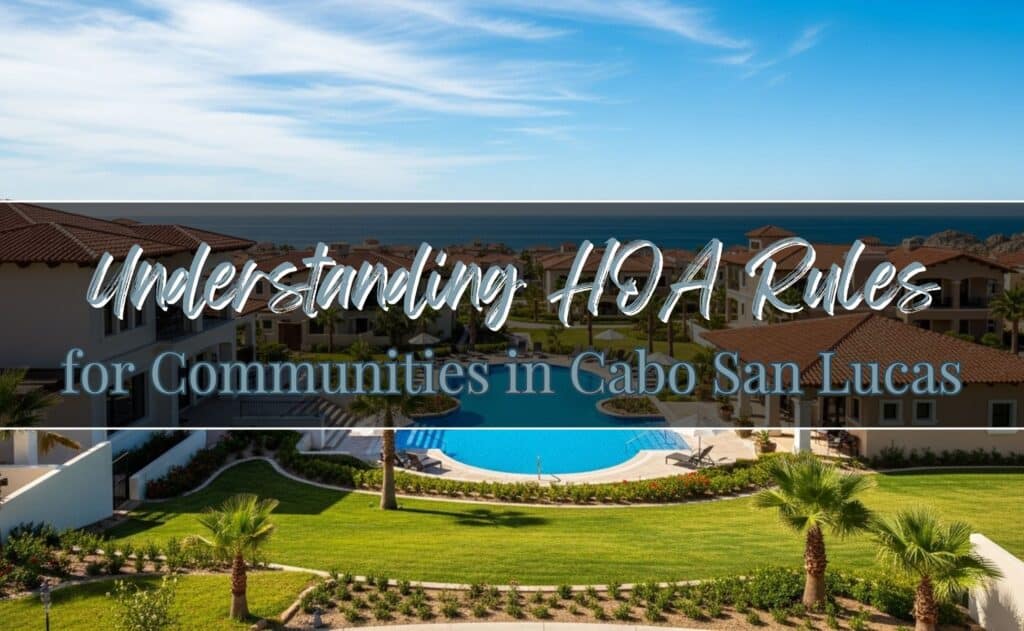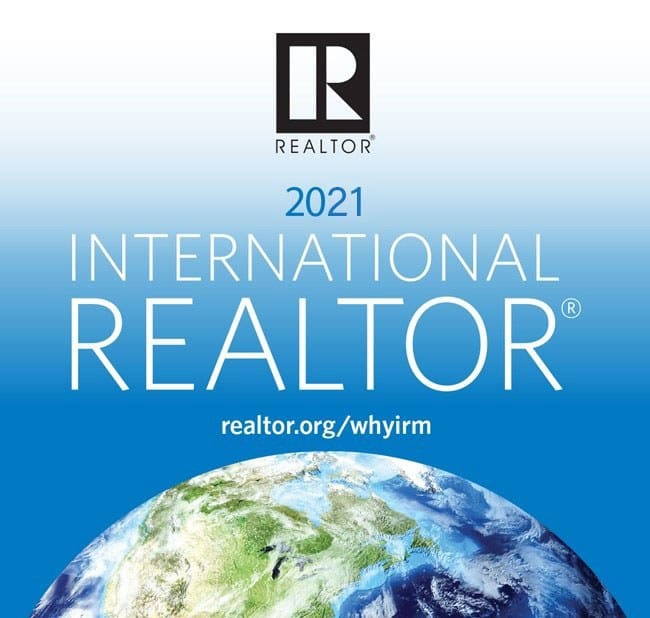Imagine waking up to the gentle sound of waves, with the golden Baja sun casting a warm glow over a pristine, palm-lined landscape. This is the dream of living in Cabo San Lucas. A life that is defined by breathtaking ocean views, world-class amenities, and a vibrant, relaxed atmosphere. Many of the most desirable properties in Cabo are located within exclusive, master-planned communities that make this dream a reality. With the incredible benefits of this community living, however, comes a shared system of governance: the Homeowner’s Association, or HOA.
Navigating the rules and regulations of an HOA can seem daunting, especially in a foreign country. But understanding how they work is the key to a harmonious and stress-free life in paradise. This guide will walk you through the fundamentals of HOA rules in Cabo’s residential communities. The goal is to empower you to protect your investment and enjoy the exceptional lifestyle you came here for.
What is an HOA and Why Do They Exist in Cabo?
At its core, a Homeowner’s Association (HOA) is a private, non-profit organization that manages a planned residential community, whether it’s a condominium complex, a neighborhood of single-family homes, or a high-end golf community. When you purchase a property within one of these communities, you automatically become a member of the HOA and agree to abide by its rules and pay its fees. The primary functions of an HOA are to maintain shared spaces, enforce community-wide standards, and manage the community’s finances.
In a world-renowned resort destination like Cabo San Lucas, HOAs play an especially vital role. Their importance goes beyond simple neighborhood governance; they are essential for:
- Protecting Property Values: Cabo is a luxury market where aesthetic appeal is paramount. HOAs enforce architectural and landscaping guidelines to ensure the entire community remains beautiful and well-maintained, which protects the value of every home within it.
- Managing Premier Amenities: From infinity pools and state-of-the-art fitness centers to private beach clubs and 24-hour security, the amenities in Cabo communities are a major draw. An HOA is responsible for the professional management, upkeep, and staffing required to keep these facilities operating at a high standard.
- Ensuring a Consistent Quality of Life: Cabo communities are often a unique blend of full-time residents, part-time “snowbird” owners, and vacation renters. An HOA establishes a clear set of rules for noise, guests, and property use that creates a consistent, secure, and enjoyable environment for everyone, regardless of how much time they spend there.

Common HOA Rules to Expect in Cabo San Lucas
While every community has its own unique set of Covenants, Conditions, and Restrictions (CC&Rs), most HOAs in Cabo San Lucas enforce rules that fall into a few key categories. Understanding these common regulations will give you a clear picture of what to expect when you buy a home in a managed community.
Property Maintenance and Architectural Guidelines
A primary goal of any Cabo HOA is to maintain a cohesive and visually appealing aesthetic, which protects property values. You can expect strict guidelines on the exterior appearance of your home.
- Exterior Finishes: Rules will dictate approved paint colors, roofing materials, and even the style of doors and windows to ensure a harmonious look throughout the community.
- Landscaping: Most HOAs have standards for landscaping, requiring yards to be kept neat and tidy. There may also be a list of approved (or prohibited) plants to maintain a consistent local flora.
- Modifications and Additions: Any changes to the exterior of your property, such as building a patio extension, installing a satellite dish, or adding solar panels, will almost certainly require prior approval from an architectural review committee.
Use of Common Areas and Amenities
The luxurious shared amenities are a highlight of living in Cabo. HOA rules ensure these facilities are kept safe, clean, and accessible for all residents.
- Pools and Spas: Expect rules regarding operating hours, guest limits, and safety precautions (e.g., no glass containers).
- Fitness Centers and Clubhouses: Regulations often cover equipment use, reservation policies for private events, and general etiquette to ensure a pleasant experience for everyone.
- Access: Rules will specify how residents, guests, and renters can access these amenities, often involving key cards or check-in procedures.
Noise, Nuisances, and Pets
To ensure a peaceful environment for all, HOAs establish clear quality-of-life regulations.
- Noise: Most communities enforce “quiet hours,” typically from the late evening to the early morning, to limit disturbances.
- Pets: Cabo is a pet-friendly destination, but HOAs will have specific rules. These often include restrictions on the number, size, or breed of pets, as well as strict requirements for leashes in common areas and immediate cleanup of pet waste.
Parking and Vehicles
Parking is often carefully managed to maintain order and preserve the community’s aesthetic.
- Assigned Parking: It’s common for properties to have assigned parking spaces. There will be specific rules for guest parking, which may be limited to designated areas.
- Vehicle Restrictions: To maintain a residential feel, many HOAs prohibit parking oversized vehicles, such as RVs, boats, or commercial trucks, within the community for extended periods.
Rentals and Guests
Given Cabo’s status as a top vacation destination, rental policies are a critical component of HOA governance.
- Rental Policies: The HOA will have clear rules distinguishing between short-term (vacation) and long-term rentals. Some communities may have minimum stay requirements or even caps on the number of homes that can be rented out at one time.
- Owner Responsibility: As the property owner, you are ultimately responsible for the conduct of your guests and renters. The HOA will require you to ensure they are aware of and abide by all community rules. Some may even require you to register your renters with the administration office.
The Financial Aspect of HOAs: Fees and Assessments
Understanding the financial obligations is a critical part of buying into an HOA-managed community. These fees are the engine that keeps the community running smoothly and looking its best. Generally, the financial responsibilities fall into two categories: regular dues and special assessments.

Regular HOA Fees (Dues)
These are recurring fees, typically paid monthly or quarterly, that cover the community’s annual operating budget. While the exact amount can vary significantly based on the size of the community and the extent of its amenities, your HOA dues generally cover:
- Maintenance: Landscaping, street cleaning, and upkeep of all common areas like pools, gyms, and clubhouses.
- Utilities for Common Areas: Water, electricity, and gas for pools, streetlights, and security gates.
- Security: This can range from a gated entrance to 24/7 on-site security personnel, a significant factor in many Cabo communities.
- Insurance: A master policy that covers common areas and the community’s liability.
- Reserve Fund: A portion of your dues is set aside in a reserve fund, which acts as the community’s savings account for future large-scale repairs and replacements (e.g., repaving roads, replacing a roof on the clubhouse).
Special Assessments
A special assessment is a one-time fee levied on homeowners to cover a significant expense that is not covered by the regular budget or the reserve fund. While well-managed HOAs try to avoid them, they can be necessary for unforeseen circumstances or major capital improvements. Examples include:
- Repairing significant damage after a major storm or hurricane.
- Funding a major, unbudgeted renovation project.
- Covering a legal judgment against the HOA.
Before buying, it’s wise to inquire about the health of the HOA’s reserve fund and ask if any special assessments are planned for the near future.
Tips for a Positive HOA Experience
Your relationship with your HOA doesn’t have to be complicated. With a proactive and informed approach, you can ensure a smooth and positive living experience.
- Read Before You Buy: This is the single most important step. Before you close on your property, perform your due diligence by thoroughly reviewing all the HOA’s governing documents. This includes the CC&Rs, bylaws, and the most recent financial statements and meeting minutes. These documents are the blueprint for the community and will give you a complete understanding of your rights and responsibilities.
- Get Involved: The best way to have a voice in your community is to participate. Attend HOA meetings to stay informed about important decisions and financial matters. Consider volunteering for a committee or even running for a board position to take an active role in shaping your community’s future.
- Communicate Effectively: If you have a question, concern, or a formal request, be sure to follow the proper channels. Address your communications to the HOA board or the designated property management company rather than just a neighbor. Keeping your communication professional, clear, and in writing can lead to a much more effective resolution.
- Be a Good Neighbor: Remember that the HOA is simply a reflection of the community itself. By following the rules, maintaining your property, and being considerate of those around you, you contribute directly to a more harmonious, beautiful, and valuable community for everyone.
What to Do if You Disagree with an HOA Rule or Decision
Even in the most well-run communities, disagreements can occasionally arise. If you find yourself at odds with a particular rule or a decision made by the HOA board, it’s important to handle the situation calmly and professionally.
- Review the Governing Documents: Your first step should be to consult the HOA’s bylaws and CC&Rs. These documents will outline the official procedure for filing a grievance, appealing a fine, or requesting a hearing with the board.
- Communicate Formally and in Writing: Voice your concerns through the proper channels. Submit a formal written letter or email to the HOA board or management company, clearly and respectfully explaining your position. This creates an official record of your communication.
- Attend a Board Meeting: Request an opportunity to speak at an HOA board meeting. Presenting your case in person allows for a direct, constructive dialogue and can often lead to a mutually agreeable solution.
- Seek Mediation: If direct communication doesn’t resolve the issue, mediation can be an effective next step. A neutral third-party mediator can help facilitate a conversation between you and the HOA to find common ground without resorting to legal action.
- Consult Legal Counsel: As a final resort for serious disputes, you may need to seek legal advice. Be sure to find a lawyer who is experienced in Mexican property law and HOA regulations.
Conclusion: Your Partner in Paradise
A Homeowner’s Association is an integral part of community living in Cabo San Lucas. Far from being a simple list of restrictions, it is a framework designed to protect your investment. By understanding the rules, participating in the community, and communicating effectively, you can enjoy all the benefits of your slice of paradise without any of the stress.
At Coastal Properties of Cabo, we have experience navigating the nuances of different community regulations is a key part of the home-buying journey. Contact Coastal Properties of Cabo today. Our experienced agents are here to guide you through every step of the process. We do our best to ensure you find the perfect community fit that you’ll be proud to call home.


